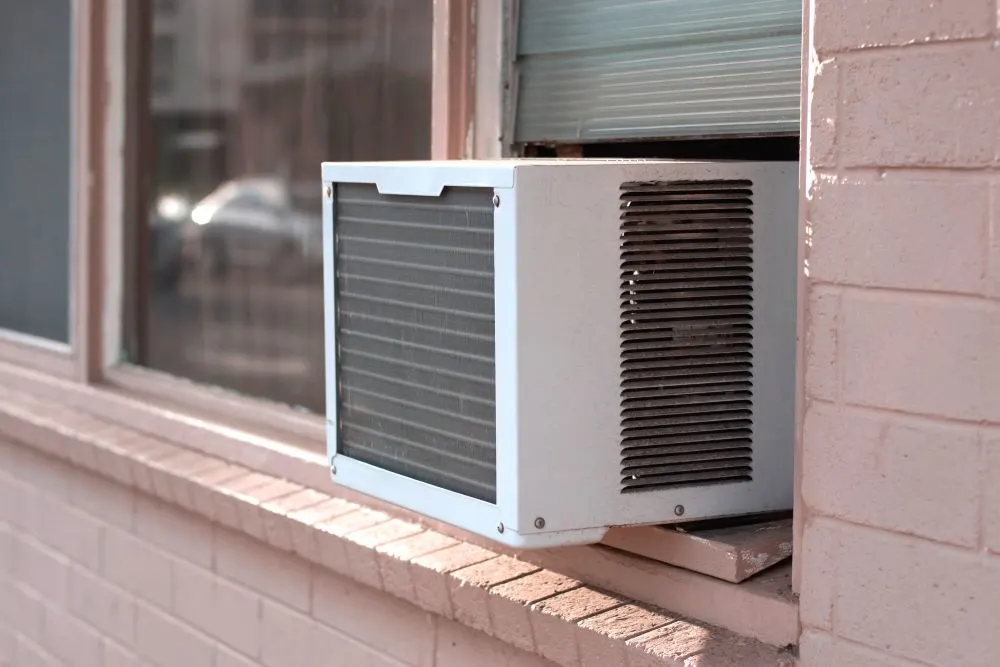Window air conditioners are cost-effective and convenient cooling solutions. However, they tend to be eyesores and make noise. This puts them on an HOA’s most-hated list, and HOAs may deny residents’ wishes to install window AC to avoid lowering property values.
Depending on the CC&Rs, you may be able to work with your HOA to install window AC. If you’ve hit an AC roadblock because of HOA restrictions, then below you can find all your options to appeal to the HOA or find alternative cooling solutions.

Appeal to HOA. Appeals are less likely to be denied if the AC looks good, is quiet, and installed in an out-of-sight window. Offer to use an HOA-approved installer and give details on how ACs increase a house’s value. If still denied, try geothermal cooling, evaporative coolers, portable ACs, or ceiling fans.
Are HOAs Allowed to Deny Window AC?
HOAs have the power to write and enforce any rules in their contract (that don’t discriminate or encroach on human rights). By signing this contract, residents agree to follow these rules and comply with HOA requests in exchange for higher property values.
Not all HOAs are the same, though. Each HOA is its own legal entity that decides where to focus its interests and use its power. Typically, though, contract terms focus on the exterior of a home. Because window AC units can be seen from outside and may make noise, HOAs are within their rights to deny installation.

Why Would HOA Deny Window AC?
Window AC units may be denied for many reasons. The main reason is that aesthetically they make a property look less appealing. Since one of the chief reasons for why the HOA exists is to keep property values up, they are less likely to support the installation of a clunky AC unit with unattractive vents.
Window AC units can also cause noise disturbances depending on their type and size. In this situation, the HOA can tell you what to do inside your house because it’s an activity that will disturb neighbors.
Finally, window ACs can be dangerous if the appliance falls from a window. An HOA may therefore deny window units to protect other residents.
Solving Your HOA AC Issue
Read Your CC&Rs
First, you’ll need to check your CC&Rs (Declaration of Covenants, Conditions, and Restrictions) and bylaws for what is said about window AC. This is a legal document created by the HOA that establishes the rules of the community. You signed the HOA contract agreeing to these conditions, so you’ll have to follow them.
Some HOAs may outright forbid the installation of window AC, while others may specify the tolerated noise level, size of the unit, or location (for example, perhaps units are only denied for street-facing windows).
If nothing is explicitly stated about window AC units, as long as other restrictions aren’t broken you should be able to go ahead with the project, but it’s always good to play it safe and appeal to the HOA before actually installing the appliance.
Once you know the restrictions that are in place, you can go about finding a unit that meets the requirements of the HOA.

Do Your HVAC Research
If your HOA allows window AC units, it’s now time to choose the unit you want installed. Find the most aesthetically-pleasing and silent unit possible.
This is also when you’ll want to get a quote from an HVAC specialist about installation. Your HOA may already have HVAC personnel they work with, so it might be worth it to reach out and ask if they prefer you use a specific connection they have.
If you’ll be requesting the HOA to allow you to install a window AC unit, research positive cases where HOAs allowed window units in the past. This will establish a precedent encouraging them to allow your window AC.
Present Your Case Well
Once you’ve thoroughly researched your window AC unit, it’s time to present your case to the HOA. Depending on the contact info given, this can be done via phone call, a meeting, or email.
What you’ll want to highlight is how a window AC will add to the value of the property. Explain that air conditioning is beneficial for the comfort of residents, reducing humidity that may degrade living spaces, and improving air quality.
Show them that you’ve read the CC&Rs by referencing them in your proposal, and lay out the research you’ve done to find the best unit.
Present your plan for installation and maintenance to further show your commitment to the project and your awareness of its effect on others. Communicate in a friendly and confident way.
Do Not Install the AC Without Permission
Many HOAs ban window-mounted AC units. It is not a wise idea to disobey this ban. HOAs have legal authority over their members that can lead to real consequences. In addition, the installed AC unit will likely get removed if you install it without permission.
Though you won’t be “breaking a law” by disobeying HOA rules, you’ll be subject to possible fines, bans from community facilities, or a lien on your home. In the worst-case scenario, an HOA might foreclose your property if you don’t pay the fines/lien for breaking the CC&Rs, but HOAs are not allowed to evict you.
With HOAs, it is NEVER easier to ask for forgiveness than permission.
AC Alternatives
If the CC&Rs actually state that you cannot install a window AC, then you signed a contract agreeing to this, so there is little you can do. You can try to appeal the rule as it applies to you. But if your CC&Rs state that window AC is not allowed and you approach them with an appeal that gets denied, you’ll have to find an alternative cooling solution.
Directly asking the HOA what cooling systems are allowed may be your quickest bet.
There are many options for non-window AC, such as geothermal cooling, evaporative coolers, portable air conditioners, or simply a ceiling fan. Central AC is usually too difficult to implement in a condo or apartment setting if it hasn’t already been installed.
Geothermal cooling can be very expensive upfront but are very energy efficient. Ceiling fans, while less costly, are not ideal as they don’t actively cool the air; they just create air movement.
Evaporative coolers remove heat from the air through the evaporation of water, so they’re more beneficial in drier climates. This Hessaire Portable Evaporative Cooler (amazon link) is a best seller that cools 500 square feet.
In contrast, air conditioners use refrigerants that tend to slightly dry out the air. Similar to a window unit, most portable air conditioners have a single or dual hose system you’ll need to run out of a window or otherwise connect to the outside air. The Black and Decker Portable Air Conditioner (amazon link) is a quiet system that cools up to 450 square feet.
Sources
https://www.sherlockair.com/blog/when-hoa-affects-your-hvac-requirements/
https://cedarmanagementgroup.com/homeowners-rights-against-hoa/

